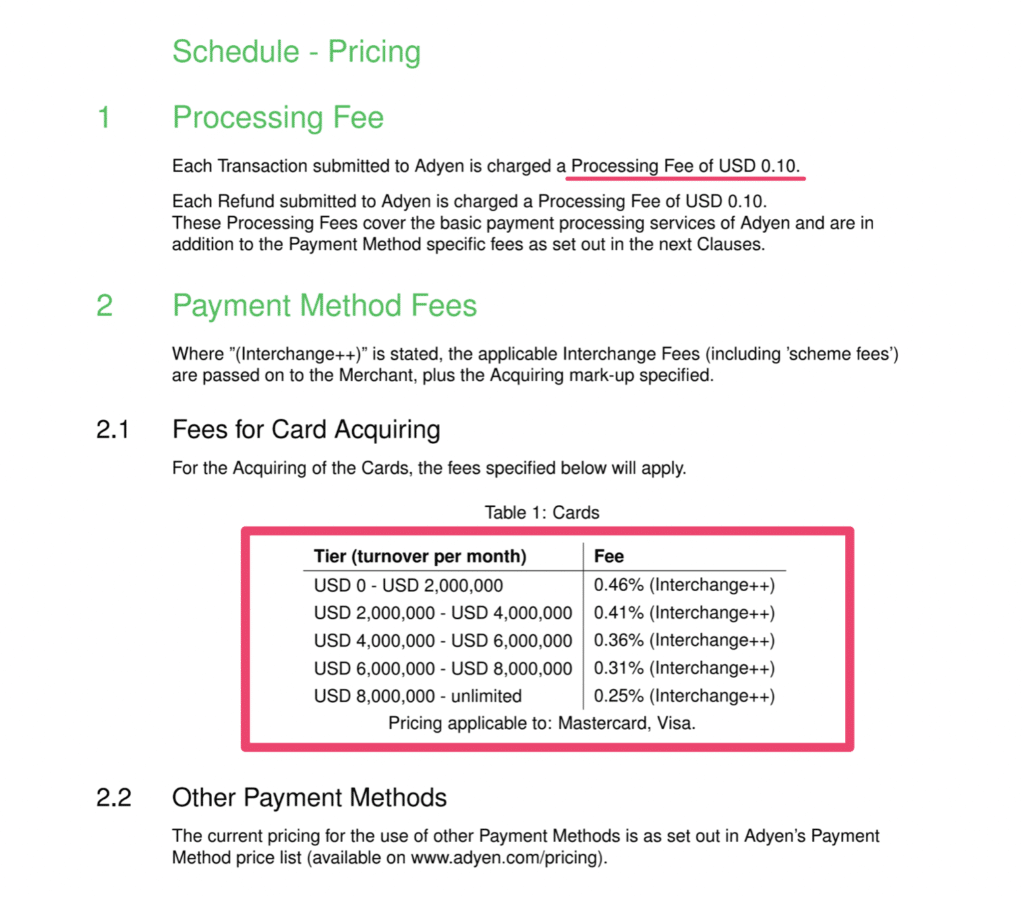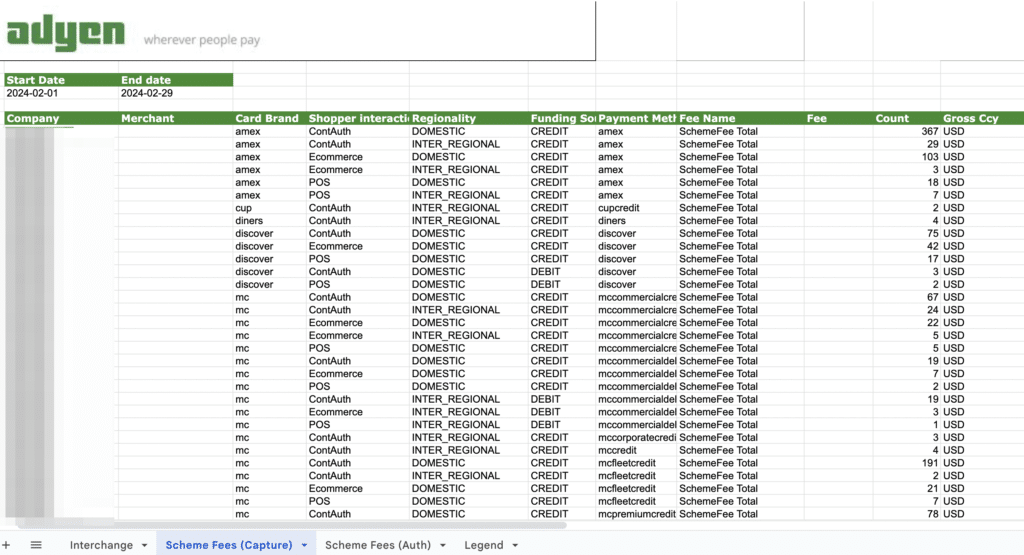Adyen is a Dutch-based payment processor that was founded in 2006. They provide a wide range of payment solutions to businesses worldwide, powered by some of the best technology on the market today.
We have tons of experience with Adyen, as several MCC clients use them to process payments. This means that we’ve negotiated with Adyen directly and have access to statements and contracts that you won’t find anywhere else.
So whether you’re thinking of switching to Adyen or you’re a current Adyen customer who just wants to follow up on your decision, this is the most comprehensive Adyen review you’ll find on the web.
Rather than just regurgitating the same stuff you can find on Adyen’s website, this review provides a unique perspective based on our experience and knowledge of the payments space.
MCC Quick Take on Adyen
Adyen shines for its cutting edge-technology. They have everything businesses need to automatically optimize processing rates, including optimized debit routing, network tokens, advanced retry authorizations, and more.
While Adyen is definitely considered to be a newer player in the payment space, it’s slowly starting to gain momentum, and the technology really speaks for itself.
They’re easy to work with and flexible on pricing.
What We Like About Adyen
- Arguably the best technology in the payments industry right now.
- Interchange++ pricing model, which is extremely transparent.
- Our clients haven’t experienced any pricing increases.
- Adyen’s integration API makes it easy to embed payments into third-party POS solutions, accounting software, practice management systems, and more.
What Adyen Falls Short
- Spreadsheet-style reporting feels dated compared to its otherwise superior technology.
- While reports are very transparent, they’re difficult for most businesses to read.
Overall, it’s safe to say that we like more about Adyen than we dislike. We’ve had a great experience working with them and I expect that to continue in the future.
I imagine rate increases will come at some point in the future, but we can’t fault them for something that hasn’t happened yet.
Adyen Pricing and Credit Card Processing Rates
Adyen operates on an interchange++ pricing model, which is somewhat rare to find and slightly different than an interchange plus structure. Fees are based on three components—the interchange rate, scheme fees, and the acquiring bank markup.
This is the most transparent way for a processor to break down its pricing, which we love to see, as it gives us a complete look at where every cent is coming from.
According to Adyen’s pricing page, rates start at $0.13 + 0.60% markup over IC++ for Visa and Mastercard.
However, we know that Adyen is willing to negotiate those rates even lower.
Here’s a proposal we negotiated for one of our clients, with Visa and Mastercard markups starting at 0.46% + $0.10 per transaction.

This is a tiered IC++ pricing model, where the acquirer markup fee gets reduced as monthly transaction volume increases.
As you can see, this drops all the way down to 0.25% + $0.10 per transaction for merchants processing over $8 million monthly.
But with Adyen’s IC++ pricing, there are lots of different factors determining the exact rate you’ll pay per transaction. We’ll talk about this later on when we take a closer look at an Adyen merchant statement.
Other Adyen Fees to Look Out For
In addition to the transactional rates, Adyen charges miscellaneous fees for certain payments and scenarios. Examples include:
- Refund Fee — $0.10
- Chargeback Fee — $10
- Chargeback Reversal — $0.20
- Revenue Protect Service Fee — $0.06
- Account Updater Service Fee — $0.25
- Authentication Service Fee — $0.06
- Network Token Service Fee — $0.25
- Management and Reconciliation Service Fee — 0.20%
- Forex Management For Visa/Mastercard — 0.30%
Again, these fees may or may not apply to your transactions. It all depends on how you’ve set up your account and what you’re doing.
For example, the Management and Reconciliation Service Fee only applies to merchants who have a direct contract with a third-party acquirer or scheme service and are using Adyen to route those transactions.
How Does Adyen Compare to Other Payment Processors?
Adyen is most similar to Braintree and Stripe. All three of these providers are newer, tech-forward options and offer similar services.
I think Adyen has the best technology of the three. But its pricing falls right in the middle.
Braintree’s rates are by far the best. We’ve seen them starting as low as 0.06% + $0.06 per transaction, which you likely won’t find anywhere else.
Stripe’s advertised rates are the most expensive. These can be negotiated, but Adyen is lightyears ahead of Stripe in terms of its pricing competitiveness and how easy they are to work with.
It can be tough to get Stripe to budge off their prices unless you need lots of other services (that they can charge for). Whereas Adyen is much more flexible price-wise.
It’s also worth noting that Adyen has the edge compared to Stripe and Braintree for brick-and-mortar businesses.
While all three of these processors let you accept payments in person, this service is more of an afterthought for Stripe and Braintree. They’re definitely neglecting this market and prioritizing technology for online payments. But Adyen is equally good for in-person payments.
You can read our Stripe review and Braintree review to learn more about these alternatives to Adyen.
How to Read Your Statements From Adyen
Adyen’s reporting is transparent but complex. Since they offer IC++ pricing, they break down fees in a way that’s different from other processors.
If you download your monthly report as a spreadsheet, you’ll see three tabs—interchange, scheme fee (capture), and scheme fee (auth).
On each of these tabs, you’ll find detailed information about different transaction categories, including:
- Card Brand — Visa, Mastercard, etc.
- Shopper Interaction — POS, Ecommerce, etc.
- Region — Domestic, International, or Inter-regional
- Funding Source — Debit, Credit, Prepaid, Deferred Debit, etc.
- Payment Method Variant — Visa Fleet vs. Visa Premium vs. Mastercard Commercial vs. Maestro, etc.
- State — This is the final state of the transaction (authorized, canceled, refused)
There’s a lot to take in here.
In a recent report from one of our clients, just the interchange tab alone had over 250+ line items of categories. Here’s a screenshot of that report so you can see what I mean:

This shows just 30 lines on a single tab of a report that has over 670+ line items.
Remember, this is just one month of reporting. In this example, it’s February (the shortest month of the year).
Here’s the point I’m trying to make—this is very complicated stuff.
I love it because it really doesn’t get more transparent than this. But the average business doesn’t have someone on their staff who can read this every month and understand if they’re being charged correctly and if their fees are actually being optimized as they should be.
That’s why working with a merchant consultant can be invaluable for your company.
Our team here at MCC can analyze these statements on your behalf to look for cost savings opportunities. Then we’ll negotiate those rates directly with Adyen, so you can save money without having to switch processors.
We’ll even continue to monitor your statements every month to ensure your rates don’t go up.
Our Final Thoughts on Adyen
We really like Adyen. It’s one of the few processors on the market that doesn’t increase rates and offers IC++ transparency.
Our team has successfully worked with Adyen to reduce processing fees for our clients, and the staff at Adyen has been open to our negotiations.
They’re not the cheapest processor on the market. But Adyen’s tech is hard to beat, especially if you need some type of custom payment solution. Plus, the extra you pay for Adyen can be slightly offset by its automatic cost optimization features.
We are not an Adyen affiliate and we stand nothing to gain if you decide to use them. So I have no hidden agenda or ulterior motive to recommend them. That said, they are one of the best processors on the market today. So if you’re on the fence, you really can’t go wrong.

